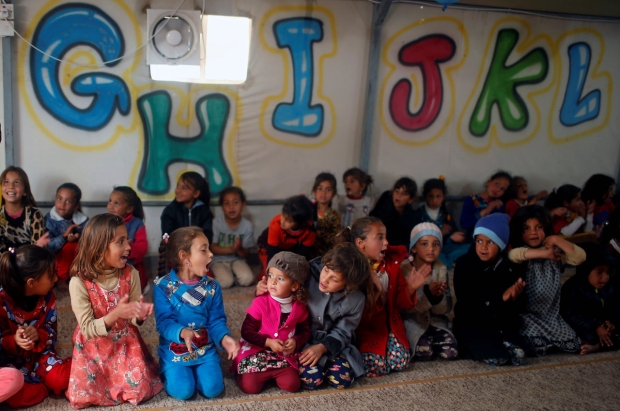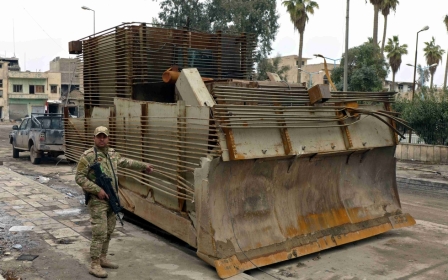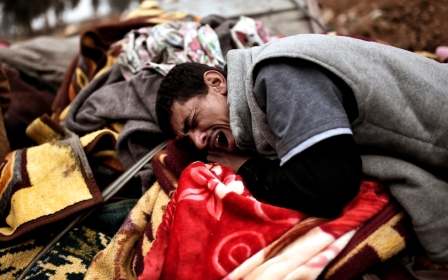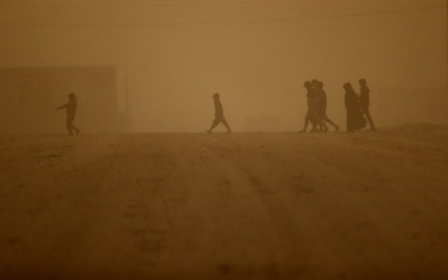UN chief appeals for more aid for trapped Mosul residents
UN chief Antonio Guterres has appealed for more aid and international solidarity for the people of Mosul, as he visited a camp for Iraqis displaced by fighting between the Islamic State group and Iraqi forces backed by a US-led coalition.
"We don't have the resources that are necessary to support these people and we don't have the international solidarity that is needed," Guterres told journalists during a visit to the Hasan Sham Camp Friday.
"Unfortunately, our programme here is only funded at eight percent; that shows how limited our resources are," he said.
At least 355,000 residents have fled fighting, according to the government, and some 400,000 civilians remain trapped inside the densely-populated Old City where street battles have raged for weeks.
During his visit, which lasted about half an hour, residents complained to Guterres about the quality of drinking water and poor living conditions in tents frequented by mice and insects.
"We want to go back to our villages. We are fed up," said Saqr Younis to Reuters, who fled to Mosul when Islamic State arrived in his village in 2014.
"If we had died by bombardment it would have been more merciful," said Saqr who has been in the camp for four months
Guterres said he would "focus on the dire humanitarian situation on the ground. Protection of civilians must be the absolute priority," in a post on his official Twitter account.
Guterres said that protecting civilians was an “absolute priority” as Iraqi forces continue to seize back most of the country’s second-largest city from IS in a massive six-month campaign, backed by US-led coalition airpower.
The Iraqis are now within 500 metres of the al-Nuri Mosque, from where IS leader Abu Bakr al-Baghdadi declared a caliphate spanning parts of Iraq and Syria in July 2014.
Guterres’ comments come days after the US-led coalition admitted that it “probably” played a role in Mosul civilian casualties. The Americans have since accused IS of attempting to encourage strikes that would result in civilian deaths.
The Iraqi government has also sought to blame the militants for the deaths, and spokesman Colonel Joe Scrocca also accused IS of attempting to bait the coalition into carrying out strikes that would kill civilians in order "to take advantage of the public outcry and the terror."
Islamic State still a threat
Scrocca also said the number of militants remaining in Mosul has fallen significantly since Iraqi forces launched the operation to retake the city's west last month, from an estimated 2,000 at that time to less than half that now.
The militants still pose a threat, however, even in the capital, and would continue to do so even if they no longer controlled significant territory.
Illustrating the danger, a suicide truck bombing claimed by IS killed at least 14 people at the main southern entrance to Baghdad on Wednesday evening.
Iraqi forces launched a major operation to win back Mosul in October, retaking its eastern side before setting their sites on the smaller but more densely populated west.
The fighting has inflicted heavy casualties on the Iraqi security forces, according to the head of US Central Command, General Joseph Votel.
Votel told a congressional committee that 490 Iraqi security personnel were killed and more than 3,000 wounded in the battle for east Mosul, while 284 have been killed and more than 1,600 wounded in fighting for the west.
After his arrival in Baghdad, Guterres met Prime Minister Haider al-Abadi, President Fuad Masum, parliament speaker Salim al-Jabouri and Foreign Minister Ibrahim al-Jaafari.
"Iraq is in the final stages of its fight against terrorism. We are strongly hopeful that the liberation of Mosul will soon be completed," Guterres said alongside Abadi, according to a copy of his remarks seen by AFP.
Iraq remains divided
Yet the country still remains divided. Iraq's Sunni Arabs resent the control of the Shia majority over state bodies including the military, established after the US-led invasion that toppled Saddam Hussein in 2003. A weakened army stemming from the Sunni-Shiite rift was unable to cope as Islamic State fighters overran about a third of Iraq in a lightning campaign in 2014.
Meanwhile, the Kurds, who backed that US-led invasion, are in conflict with the Shiite-led government over land and oil resources.
Guterres called on leaders to build "a state in which all communities respect each other and reconciliation becomes something natural", according to a UN statement.
Jaafari highlighted the issue of reconstruction in talks with Guterres - a major challenge in areas that have been devastated by heavy fighting to retake them from IS.
"Iraq needs a plan similar to the Marshall Plan... to present assistance to Iraqis and support development and overcome the effect of war against (IS) terrorist gangs," Jaafari said, according to his office.
The Marshall Plan was a major US effort to help Western Europe recover from the devastation it suffered in World War II.
Middle East Eye propose une couverture et une analyse indépendantes et incomparables du Moyen-Orient, de l’Afrique du Nord et d’autres régions du monde. Pour en savoir plus sur la reprise de ce contenu et les frais qui s’appliquent, veuillez remplir ce formulaire [en anglais]. Pour en savoir plus sur MEE, cliquez ici [en anglais].





